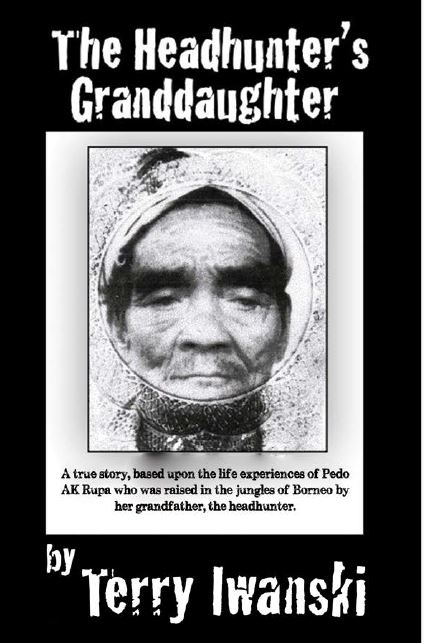THE HEADHUNTER’S GRANDDAUGHTER has an extraordinary beginning. Its subject, Pedo A.K. Rupa—the wife of the author, Terry Iwanski—was born in the Bornean jungle. Having been given away by her parents, whose children numbered in the double figures, Pedo spent the first years of her life being cared for by her grandfather (the headhunter of the book’s title) and was shortly set to work by her uncle, who beat her and forced her to collect rubber. A glimpse of an airplane passing overhead was an inflection point, with Pedo resolving to escape her life of drudgery and abuse. At the age of twelve, she did so, running away to the nearby city of Kuching with the help of an older girl in the village. The change in circumstances was abrupt; she would never see her grandfather, her friend, nor her uncle again.
Given all the things that could have happened to a twelve-year-old girl on her own in a new environment, Pedo managed surprisingly well, becoming a nanny and housemaid before later finding work in a restaurant. An unplanned pregnancy left her a single mother, but a chance meeting with Iwanski led to a whirlwind romance, a marriage, and, finally, a move to the United States at the turn of the 1990s. This is where the pair have lived ever since—barring an abortive sojourn in Kuala Lumpur in pursuit of a business opportunity that ended poorly. The book is well-formatted and presented on the whole, though a sprinkling of typos (“cleary” for “clearly”; “pace and forth” for “pace back and forth” and so on) is irritating, and two photographs are wrongly labeled on page 92.
The clash of cultures is profound, and the nature of the relationship between Pedo and Iwanski—whom she unironically calls her “Sugar Daddy” at one point—is also of interest. But in contradistinction to the usually loaded nature of the relationship suggested by that term, the link between the pair never seems anything less than deep, genuine, and heartfelt. Both were second-time-around lovers at the time of their meeting, and although occasional chafing occurred—Pedo declares she was “utterly miserable” during the cold Nebraskan winters that were her lot before moves to Arizona and, briefly, California—the pages glow with affection.
However, an issue with the book is that the second half is simply not as engaging as the first. Barring the details peculiar to their own particular lives, Pedo and Iwanski’s ups and downs in America are more or less those of any married couple, and anecdotes of decidedly variable interest about international travel and the couple’s homelife struggle to sustain the reader. (Neither do the tiresomely regular references to the couple’s sex life, which, when they encompass a recounting of the act, frequently tend toward the graphic.) There are hints at wider narratives: Pedo’s deep sense of the worth of her own beauty; the sometimes-clashing, sometimes-complimentary understanding that the pair have of their respective gender roles; and, finally, Pedo’s return to her childhood home (which results in complicated memories and a reflection on the difference between her current wealth and the poverty in which she lived). But THE HEADHUNTER’S GRANDDAUGHTER might have worked better had it ended on that note, rather than expounding on everyday activities that, though obviously of interest to those involved, offer little clarity or enlightenment about life in today’s America.
Terry Iwanski’s THE HEADHUNTER’S GRANDDAUGHTER is a memoir that benefits from a remarkable first half and an inspiring journey.
~Craig Jones for IndieReader

